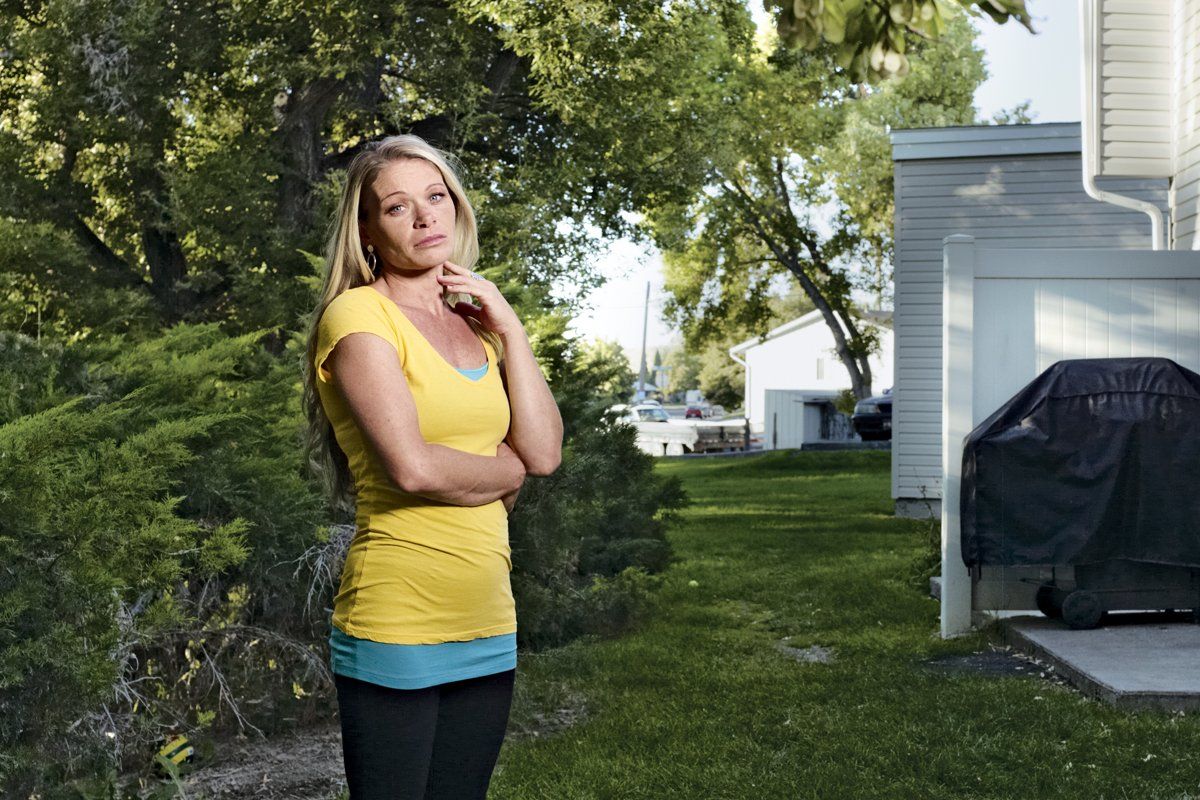
The last thing on Jennie Linn McCormack's mind when she realized she was pregnant was that she might, with a single telephone call, upend the vitriolic national debate on abortion.
All she thought about was how it would be impossible for her to take care of another baby. Surviving, barely, on the $250 of monthly child support for one of her three kids, the unemployed, unmarried 32-year-old also knew she didn't have the more than $500 she'd need for the two-and-a-half-hour trip from her bare-bones rental in Pocatello, Idaho, to Salt Lake City, the closest city with a clinic willing to terminate a pregnancy. She had no computer, no car, no one to take care of her 2-year-old—and like Idaho, Utah had a waiting period for abortions, which meant she'd have to make two round trips. So early this past January, she made the call that may alter history and turn Jennie McCormack into Jane Roe's unlikely successor: she asked her sister in Mississippi to buy RU-486, the so-called abortion pill, over the Internet and send it to her. The cost: about $200.
"My mind just kept going back to my kids, how there was no way I could do that to them, no way I could make their lives even worse," says McCormack, a petite blonde, as she nearly sinks between the cushions of her sofa, her eyes rimmed with tears. The man who had impregnated her had just been sent to jail for robbery; she did not feel comfortable reaching out to her mother—Mormon, like almost everyone in southeastern Idaho—for help.
McCormack, who thought she was about 12 weeks along, took the pills (the protocol involves two drugs, mifepristone and misoprostol) the afternoon they arrived. The drugs are FDA-approved only for ending early-stage pregnancies; McCormack had no complications, but the pregnancy turned out to be more advanced than she thought—perhaps between 18 and 21 weeks, experts later speculated—and the size of the fetus scared her. She didn't know what to do—"I was paralyzed," she says—so she put it in a box on her porch, and, terrified, called a friend. That friend then called his sister, who reported McCormack to the police.
Although RU-486 is legal and the fetus was not yet "viable" (that is, old enough to live outside the uterus), Idaho has a 1972 law—never before enforced—making it a crime punishable by five years in prison for a woman to induce her own abortion. The day after police arrested McCormack, her mug shot appeared above the fold in the local newspaper. "It's hard to imagine the humiliation and fear," says her lawyer, Richard Hearn, who is also a physician.
The case was dropped weeks later due to lack of evidence. Without solid proof, such as the envelope in which the pills came, her confession wasn't enough to sustain the case. But prosecutors retained the right to re-file charges. In response, Hearn got a federal injunction to prevent any woman from being prosecuted under the state's anti-abortion statute by the district attorney. He also filed a class-action suit against the state, claiming the statute is unconstitutional. But all that took nine months to play out, and McCormack lurched into depression and became a virtual shut-in.
"You'd have to know the climate here," says Hearn, "to fully imagine the amount of pressure Jennie is under, how hostile people can be, how isolated she is." Next week, motions will be heard in federal court to certify the suit as a class action. Last week, the prosecutor filed a motion to have Hearn's injunction lifted. (The prosecutor's office did not return calls seeking comment.)
The case has become a huge tangle for both sides of the abortion battle—state laws that put abortion beyond the reach of poor women are clashing with the global reach of the Internet. With Hearn ready to take his case to the Supreme Court, Jennie Linn McCormack may be above the fold for years to come.
"It's a profoundly important case," says Arthur Caplan, director of the Center for Bioethics at the University of Pennsylvania. "But it's one that neither the pro-choice nor the pro-life people want to deal with. And that's what makes it so crucial."
It's a bad case for both sides. The fact that McCormack kept a 4-month-old fetus frozen in the winter chill on her back porch is the sort of ghoulish image pro-choice activists try to avoid. For pro-life advocates, supporting her arrest would contradict a longstanding policy of targeting providers while holding women blameless. "It would require a massive change in direction if the anti-abortion movement now supported the criminal prosecution of women directly, which is why McCormack is troubling," says Cynthia Gorney, a former Washington Post reporter and the author of Articles of Faith: A Frontline History of the Abortion Wars. "It would violate everything they built the movement on."
Neither right-to-life groups nor pro-choice organizations like Planned Parenthood and NARAL Pro-Choice America—usually quick to publicize such human stories as ammunition for their cause—have made public statements on McCormack's case, and numerous calls to spokespeople on both sides of the issues went unreturned.
"McCormack puts them places that complicate the storyline. It's the new frontier," says Gorney, now a journalism professor. "Once you remove the providers, you have no one to picket or pressure. Abortifacient drugs and the Internet change the debate forever. "
Despite the reticence of pro-choice groups to take up McCormack's cause, it is exactly what they have been warning of for years: as clinics become inaccessible, poor women are more likely to take abortion into their own hands. In the era before Roe v. Wade, that meant back-room abortions; now it conjures images of a lonely woman in a small town at her keyboard Googling "abortion pill." Hundreds of online merchants will send RU-486 without a prescription, according to Women on Web, an organization that sends the drugs to women in countries where abortion is illegal.
No one knows how many women in the U.S. have gotten the drugs this way, says Daniel Grossman, a physician who is a senior associate at Ibis Reproductive Health, a research and advocacy group in Cambridge, Mass. "[But] if women were not accessing them, these sites would not be proliferating." Although the number of abortions nationally has dropped slightly in recent years, some 35 percent of American women will have one at some point in their lives.
The proliferation of sites providing the drugs coincides with the pro-life movement's highly effective protests and attacks on physicians, clinics, and health-care groups that offer abortions. The number of Planned Parenthood affiliates has been cut in half since 1987, to fewer than 100. Almost 90 percent of counties in the U.S. and 98 percent of rural counties have no abortion services. Many clinics in states where local physicians are pressured not to perform abortions now fly in doctors from out of state to provide abortions, says Melanie Zurek, the executive director of the Abortion Access Project, a Boston-based group that offers training and support to doctors and health organizations.
While Medicaid coverage for abortions has long been outlawed, more than a dozen states now restrict private-insurance coverage of abortion. Texas cut funding for clinics that provide birth control, even if they don't provide abortion services. A South Dakota bill that would have made women wait 72 hours before getting abortions was recently blocked by a federal judge. A bill in Ohio would ban abortion after a fetal heartbeat is detected, as early as six weeks after conception. In November, Mississippi voters rejected a referendum that would have defined "personhood" at the time of conception, a notion that would have made even certain types of birth control illegal. Legal scholars on both sides agree that such laws wouldn't survive a constitutional challenge as long as Roe v. Wade stands. Which is precisely why some pro-life groups are championing them: their goal is to provoke challenges that go to the Supreme Court, which will, in their fever dream, strike Roe down.
This is, of course, the pro-choice movement's greatest fear. Spooked by the recent strong challenge in Congress to federal funding for Planned Parenthood, pro-choicers are wary about mounting legal challenges to state restrictions, for fear those challenges would end up in front of an inhospitable Supreme Court.
For the clinics that remain, the use of abortion drugs, which require no equipment and far less training for physicians than surgical options, has quietly risen. More than 20 percent of all abortions in the U.S. are now "medical" abortions, according to the Guttmacher Institute, a nonprofit, nonpartisan research group. The drugs are more than 95 percent effective in ending pregnancies up until seven weeks, according to the FDA, and are considered the best method for ending very early pregnancies.
Later-term abortions like McCormack's, even those done in a clinic, are the Achilles' heel of the pro-choice movement. Although only 1 percent of abortions in the U.S. are done after 21 weeks (about 88 percent are performed within 12 weeks), anti-abortion advocates have made such procedures their prime target. Since the Supreme Court in 2007 upheld states' rights to regulate late-term abortions, more than 35 states now have strengthened their prohibitions on clinics that performed the procedure.
Hearn, McCormack's lawyer, is less wary about challenging statutes—and undaunted by the lack of public support from either camp. The pro-choice lobby "may not think this is a good time to bring something to the court because it's so conservative," he says, "but I say no case is perfect, and if not now, when?"
In addition to his challenge of the Idaho statute criminalizing self-induced abortion, he is targeting the state's new "fetal pain" law, which is basically a clumsy end-run ban on late-term abortions. (Virtually all research on the subject shows that fetuses cannot distinguish pain until as late as the 30th week of gestation.) Four other states have recently passed similar laws, despite the fact that under Roe, abortions are legal until viability, which is around 25 weeks.
While the arguments fly, McCormack waits quietly in her small, dark apartment. A bedraggled bouquet of silk flowers hangs outside her front door along with a plaque that says "Welcome" in Spanish, French, and German. Even if her suit succeeds, there is no victory for her. She says she has "no friends at all, no one to talk to." She knows no one who's had an abortion, or at least no one who will admit it. "My mother, she's Mormon, you know? She's a proud person, and this is a terrible thing for her to have to look people in the eye." After her picture appeared in the paper, McCormack got a part-time job at a dry cleaner, using another name, but people figured out who she was and stopped letting her bag up their clothes, so she quit. On a recent trip to a local state office to apply for aid, she was ignored for hours. "They made it clear what was happening," she says. "For a while I just sat there, sort of amazed that they were just letting me sit there." Eventually, she picked up her son and went home.
Even her attempts to bury her fetus have been thwarted. Hearn put in requests to the district attorney to have the remains released from the evidence locker, but no one has responded. "I never wanted to be someone public, to make a point," McCormack says. "This isn't a cause for me. I just didn't know what to do. I did what I thought was right for my kids, that's all."
Uncommon Knowledge
Newsweek is committed to challenging conventional wisdom and finding connections in the search for common ground.
Newsweek is committed to challenging conventional wisdom and finding connections in the search for common ground.
About the writer
To read how Newsweek uses AI as a newsroom tool, Click here.








